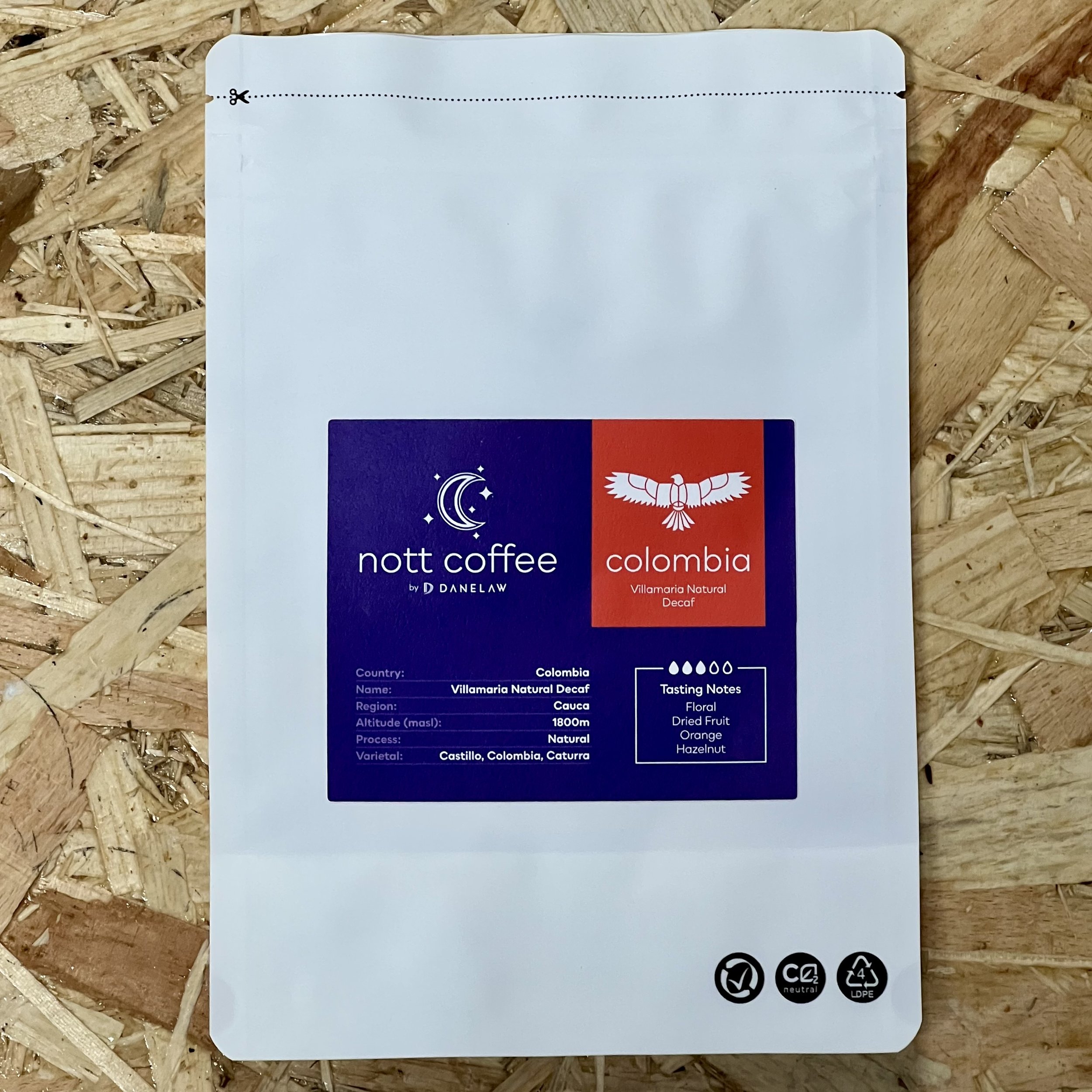Nott Colombia Natural Decaf
Working with social enterprise importer Raw Material, I selected this natural process coffee from the Villamaria Red Association in the Caldas region of Colombia. Villamaría's processing station, Jamaica, was chosen due to its perfect climate and altitude for the drying of naturally processed coffee. Alongside this, the large space available meant that producing high-quality naturals at scale was a possibility not available before.
Grown around 1800m above sea level, this coffee is a naturally processed selection of Castillo, Colombia and Caturra varietals decaffeinated using the sugarcane process and is floral with tasting notes of Dried fruit, orange and hazelnut
For the natural process, freshly harvested cherry is delivered to La Aurora where it is floated, sorted and left to rest in cherry for 24 hours. The cherries are transported to Jamaica the following day where they undergo a further 48 hours of fermentation in cherry.
They are then taken to drying beds in the greenhouse for around 15 days before being finished in the mechanical dryer for 3-4 days.
My least favourite time of day is the point at which I realise that another cup of coffee will stop me from sleeping properly. Which is what decaf is for. Nott, taken from the Old Norse for night, is my Decaf coffee range.
All Nott coffees are currently decaf processed using the Ethyl Acetate from Sugarcane method (EAFS.) This is commonly referred to as “sugarcane” or “natural’ decaf, but I think it’s really important to be transparent about the process, and not try to hide its nature behind positive-sounding labels, which could be misleading.
The Sugarcane decaf method involves steaming the beans to open them up, treating them with a solvent called Ethyl Acetate, a by-product of sugar cane processing, to remove the caffeine and then drying the beans again.
Working with social enterprise importer Raw Material, I selected this natural process coffee from the Villamaria Red Association in the Caldas region of Colombia. Villamaría's processing station, Jamaica, was chosen due to its perfect climate and altitude for the drying of naturally processed coffee. Alongside this, the large space available meant that producing high-quality naturals at scale was a possibility not available before.
Grown around 1800m above sea level, this coffee is a naturally processed selection of Castillo, Colombia and Caturra varietals decaffeinated using the sugarcane process and is floral with tasting notes of Dried fruit, orange and hazelnut
For the natural process, freshly harvested cherry is delivered to La Aurora where it is floated, sorted and left to rest in cherry for 24 hours. The cherries are transported to Jamaica the following day where they undergo a further 48 hours of fermentation in cherry.
They are then taken to drying beds in the greenhouse for around 15 days before being finished in the mechanical dryer for 3-4 days.
My least favourite time of day is the point at which I realise that another cup of coffee will stop me from sleeping properly. Which is what decaf is for. Nott, taken from the Old Norse for night, is my Decaf coffee range.
All Nott coffees are currently decaf processed using the Ethyl Acetate from Sugarcane method (EAFS.) This is commonly referred to as “sugarcane” or “natural’ decaf, but I think it’s really important to be transparent about the process, and not try to hide its nature behind positive-sounding labels, which could be misleading.
The Sugarcane decaf method involves steaming the beans to open them up, treating them with a solvent called Ethyl Acetate, a by-product of sugar cane processing, to remove the caffeine and then drying the beans again.
Working with social enterprise importer Raw Material, I selected this natural process coffee from the Villamaria Red Association in the Caldas region of Colombia. Villamaría's processing station, Jamaica, was chosen due to its perfect climate and altitude for the drying of naturally processed coffee. Alongside this, the large space available meant that producing high-quality naturals at scale was a possibility not available before.
Grown around 1800m above sea level, this coffee is a naturally processed selection of Castillo, Colombia and Caturra varietals decaffeinated using the sugarcane process and is floral with tasting notes of Dried fruit, orange and hazelnut
For the natural process, freshly harvested cherry is delivered to La Aurora where it is floated, sorted and left to rest in cherry for 24 hours. The cherries are transported to Jamaica the following day where they undergo a further 48 hours of fermentation in cherry.
They are then taken to drying beds in the greenhouse for around 15 days before being finished in the mechanical dryer for 3-4 days.
My least favourite time of day is the point at which I realise that another cup of coffee will stop me from sleeping properly. Which is what decaf is for. Nott, taken from the Old Norse for night, is my Decaf coffee range.
All Nott coffees are currently decaf processed using the Ethyl Acetate from Sugarcane method (EAFS.) This is commonly referred to as “sugarcane” or “natural’ decaf, but I think it’s really important to be transparent about the process, and not try to hide its nature behind positive-sounding labels, which could be misleading.
The Sugarcane decaf method involves steaming the beans to open them up, treating them with a solvent called Ethyl Acetate, a by-product of sugar cane processing, to remove the caffeine and then drying the beans again.







